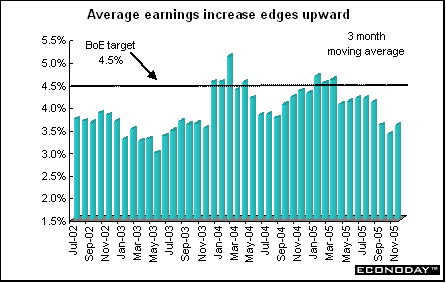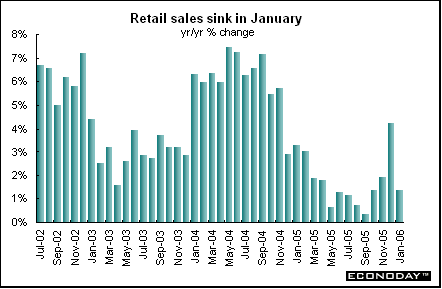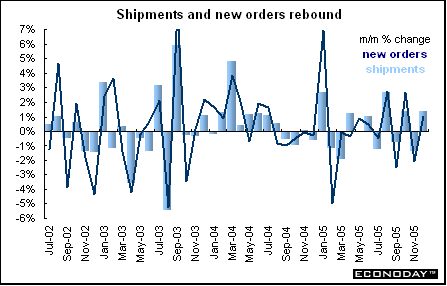After an exuberant January, investors especially in Asia appear to be tempering their enthusiasm in February. At the start of the week, the market tone was set as investors waited for new Fed Chairman Ben Bernanke to make his first appearance before the U.S. Congress to give the Fed's semi-annual testimony. As expected, there were no surprises either in his prepared testimony or in his responses to questions from House and Senate panels. Investors were reassured that monetary policy is in safe hands!
Higher oil prices apparently had a divergent effect on stocks. In the U.S., higher prices sent stocks down while in the UK and Canada, stocks were up on prospects of better profits for oil companies. By Friday, four indexes were down on the week - all in the Asia/Pacific area - with the rest regaining early week losses and then some. The Nikkei, Topix and Kospi are now below their 2005 year-end levels.
Global Stock Market Recap

Europe and the UK
After a tentative mid-week, stocks turned positive at week's end. The FTSE 100 reached its highest level since 2001, led by BP and Royal Dutch Shell as oil prices advanced for a second day. Concerns about higher energy prices were overcome by the prospect of higher profits. Crude oil prices were up after a Nigerian rebel commander said militants would declare "total war" on foreign oil companies, rekindling concern that supplies from Africa's largest producer may be disrupted. Both the CAC and DAX were also up on the week after some of Europe's biggest companies beat earnings estimates, including Societe Generale SA, Zurich Financial Services AG and Diageo Plc. Volkswagen climbed after announcing plans for 20 new models.

Bank of England Inflation Report dims chances for rate cut
In its quarterly Inflation Report released on Wednesday, the Bank of England said it expected the UK economy to expand at a faster pace later this year than its long term average and was sanguine concerning inflation expectations. As a result, the pound sterling was up and government bonds were down as hopes were dashed that the report would contain a downgrade of growth forecasts. But adding support to those who still see a rate cut in the Bank of England's future was a tame CPI reading which was below the Bank's 2 percent target for a second month running. In the report, the Bank said it expects GDP to expand by 2.7 percent in 2006 - that is stronger than the 2.5 percent pace estimated in November's report. And inflation would remain close to the bank's 2 percent target this year and next.
Bank of England Governor Mervyn King suggested that the nine-member Monetary Policy Committee would continue to debate whether the Bank should cut rates again. The Bank policy interest rate was cut by 25 basis points in August 2005 to 4.5 percent. It has been unchanged since then. The Bank meets again on March 8th and 9th.
Asia/Pacific
Asian/Pacific stocks continued to lose ground last week. Only the Hang Seng and STI managed to gain on the week. Japanese stocks suffered a broad sell-off, erasing their gains for the year and then some. Early in the week, the decline was blamed on central bank policy maker Atsushi Mizuno, who wrote that investors and borrowers shouldn't expect prolonged zero interest rates. Lenders including Mitsubishi UFJ Financial Group declined on concern higher borrowing costs would reduce demand from consumers and companies for loans. Mizuno said the central bank should control its monetary policy in order to prevent excessive expectations that its zero interest policy would last for a long period. At their February meeting, the BoJ maintained its policy of pumping cash into the economy and holding rates near zero while Bank of Japan Governor Toshihiko Fukui signaled that the bank is getting closer to ending its policy of holding rates near zero.

Overseas investors were net sellers of Japanese shares in the week ending February 11th for the first time since September, heightening fears that foreign interest in the Japanese market might have peaked. Foreign investors' enthusiasm for Japanese stocks was the primary reason for their sharp increase in 2005. Foreigners sold a net ¥252.9 billion ($2 billion), the highest amount since early June. They are also likely to be net sellers again in the February 18 week, as figures of daily orders placed with large foreign securities houses suggest overseas investors have continued to be net sellers. Foreigners have not been net sellers of Japanese shares for two consecutive weeks since April 2005 and before last year's stock market rally began in earnest.
Budget woes
The U.S. is not the only country with an outsized budget deficit. It has been estimated by some fiscal hawks that the Japanese government would need to cut more than the equivalent of its defense, education and public works budgets combined in order to balance its books by 2011. The hawks launched a counter-attack to the government's position by presenting what they consider to be the impossibility of relying on budget cuts alone in an apparent effort to shock Prime Minister Koizumi and to prove the necessity of a tax rise to close the budget deficit. But influential cabinet members including Interior Minister Heizo Takenaka have suggested that Japan can grow out of its fiscal problems. Late last year, Koizumi dismayed finance ministry officials by ruling out an increase in the politically sensitive consumption tax, now 5 percent, before 2008. The implicit suggestion that tax increases will be needed is likely to run into strong opposition from Koizumi's Liberal Democratic Party. With an eye on next year's upper house election, which the LDP will have to fight without the charismatic Koizumi, the party is keen to avoid any suggestion that it intends to bring in an unpopular sales tax increase.
Currencies
The US dollar hit a six-week high against the euro in European morning trade on Thursday as the currency market continued to digest Fed Chairman Ben Bernanke comments which were broadly judged to be upbeat. The testimony was seen as supporting market expectations of a 25 basis point increase at the FOMC's meeting in March. Most analysts expect a second increase in May, which would take the fed funds rate to 5 percent. But with the European Central Bank expected to increase their key interest rate on March 2nd and even beyond, the euro traded within a relatively narrow range and ended the week marginally higher against the dollar.

The pound sterling weakened thanks to very disappointing retail sales data that were weak across the board. It also gave a boost to those expecting the Bank of England to lower their key interest rate to boost the economy. However, those hopes were dashed by the Inflation Report which defied expectations of a weaker growth forecast and was upbeat on inflation expectations. The Bank of England policy interest rate currently stands at 4.5 percent, the same as the U.S. fed funds rate.

Despite a promising fourth quarter GDP report, the yen continued to yield to downward pressures. One reason was the GDP deflator which was down 1.6 percent in the fourth quarter. That was worse than the third quarter's decline of 1.3 percent. This substantially overshadowed the improved growth picture because it showed just how entrenched deflation really is in the economy. The yen dropped as currency traders pared bets the Bank of Japan would increase interest rates this year. The premium that two-year U.S. Treasuries pay above Japanese debt is near the highest since 2001, retaining the allure of dollar-denominated assets to international investors.

Indicator scoreboard
EMU - Fourth quarter flash gross domestic product was up 0.3 percent and 1.7 percent when compared with the same quarter a year ago. For the year 2005, it is estimated that growth slowed to 1.3 percent from 2.1 percent in 2004. As with all flash releases, no detail was available.

December industrial production edged up 0.1 percent and was up 2.5 percent when compared with last year. Nondurable consumer goods were up 0.8 percent but consumer durables, intermediate goods and capital goods were down 0.1 percent, 0.6 percent and 0.5 percent respectively. Output was down in Germany, Belgium, Greece, France and Ireland while it was up in the Netherlands, Spain and Italy.

Germany - February ZEW economic sentiment reading was 69.8, down from 71 in January. ZEW said the slight correction was in response to a temporary decline in domestic orders. It said the investment climate remains favorable and concluded that financial market experts' optimism has stabilized at a high level. The ZEW surveyed 303 German financial experts for their opinions on current economic conditions and the economic outlook for major industrial economies between January 23rd and February 13th.

Fourth quarter flash gross domestic product was unchanged but up 1.6 percent when compared with the fourth quarter of 2004. Declining private and government consumption offset rising investment. As with all flash estimates, no data were available for GDP components.

Italy - December seasonally and workday adjusted industrial production jumped 1.2 percent and was up 3.5 percent when compared with last year. Output was up for consumer, intermediate, capital and energy goods.

December world merchandise trade deficit widened to €1.7 billion from €1.2 billion in November. Much of the deficit can be attributed to higher energy prices for imports. Exports were up 4.2 percent on the year while imports soared by 8.7 percent.

Britain - January producer output prices were up 0.4 percent and 2.9 percent when compared with last year. The main reason for the increase was higher petroleum produce prices. Core output prices which exclude food, beverage, tobacco and petroleum were up 0.2 percent and 1.6 percent on the year. Producer input prices were up 1.8 percent and 16.2 percent on the year. Crude oil was up 9.2 percent while metal prices were up 1.7 percent. However, the increases were partially offset by a decline in gas prices.

January consumer price index dropped 0.5 percent but was up 1.9 percent when compared with last year. Furniture and household goods prices sank 4.8 percent on the month while clothing and footwear prices were down 4.1 percent. Core CPI, which excludes food, energy, alcoholic beverages and tobacco, were down 0.8 percent and were up 1.3 percent on the year. The retail price index excluding mortgage interest payments (RPIX) was down 0.4 percent and was up 2.3 percent on the year.

January claimant count unemployment was down 2,000 keeping the claimant unemployment rate at 2.9 percent for the fourth month. International Labour Organisation unemployment - the official unemployment measure - was up 108,000 for the three months ending in December. This pushed the ILO unemployment rate up to 5.1 percent from 5 percent for the preceding three months. Employment was down by 57,000 for the same three months when compared with the previous three months.

Average earnings for the three months ending in December were up 3.6 percent when compared with the same three months a year earlier. Private sector earnings growth was 3.3 percent while public sector earnings growth was up 4.4 percent. Manufacturing sector earnings were up 4.4 percent and services were up 3.4 percent - all for the three months ending in December compared with a year earlier.

January retail sales dropped 1.3 percent but were up 1.4 percent when compared with last year. The decline, which makes up around 30 percent of household consumption, was led by household goods which were down 3 percent. The other stores category, which includes stationers, chemists, jewelers and sports shops, also showed a large drop, sliding 2 percent, and food sales were down 1.5 percent.

Asia
Japan - Fourth quarter gross domestic product was up 1.4 percent and 4.5 percent when compared with the same quarter a year ago. On an annualized basis, GDP was up 5.5 percent. Private consumption was up 0.8 percent on the quarter as was household consumption. Private investment was up 1.7 percent. The GDP deflator declined by 1.6 percent on the year after dropping 1.3 percent in the third quarter. Some government officials have suggested that the Bank of Japan use the deflator to determine the end of deflation before changing monetary policy.

Americas
Canada - December manufacturing shipments were up 1.4 percent and 3.9 percent when compared with last year. Demand for a wide range of manufacturing goods, coupled with some factories returning to full production following temporary slowdowns in recent months, contributed to the gain. Fifteen of 21 industries accounting for 75 percent of total shipments posted increases. Nondurable goods industries shipments, led by petroleum products, increased by 1.7 percent while durable goods shipments were up 1.1 percent. At 1997 prices, total shipments increased 1.2 percent, a sign that the increase was largely volume-based despite rising industrial prices. New orders were up 1 percent and 4 percent on the year. New orders for motor vehicle parts and railroad rolling stock were partly offset by fewer orders for machinery and primary metals. Unfilled orders edged down 0.1 percent but were up 15.9 percent on the year.

Bottom line
Coming up is a short trading week in the U.S. as investors take Monday off for President's Day. While data releases are few next week, investors will be focused on the details of German GDP after a flash release that showed no growth in the fourth quarter. British analysts will be looking at the first details of their fourth quarter GDP while in the U.S., traders will look to the minutes of the January 31st meeting for policy signals along with the first revision of GDP.

